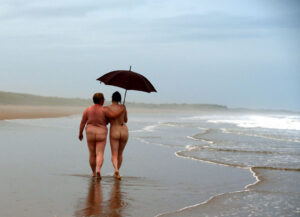At their 19th-century peak, English seaside towns welcomed millions every summer. The middle classes flocked to the coastline, to “take the air” and spend their leisure looking out at the waves over which Britannia then ruled.
Seaside piers brought these visitors still closer to the waves. To step onto one is to experience in purest form the Victorian spirit: idealism plus heavy industry. The otherworld of the pier rests on engineered pilings, steel beams and timber; but it seems to float, as though visitors are walking on the sea itself. Lapped by waves, they are meticulously constructed no-places that hold an interzone of pure play: fried treats, cheap souvenirs, the mass-produced leisure of Britain at the height of its imperial grandeur.
One senses a yearning in these structures, as interwoven with the history of these islands as the stories of kings and abbeys. It’s a spirit that still animates many today: a hankering to be not just by the sea, but on it. And it can occasionally end in tragedy, as in recent news that the British woman Sarah Packwood, 54, and her Canadian husband Brett Clibbery, 70, have been found dead on a liferaft, having washed ashore on Sable Island in Nova Scotia — a sandbar 300 kilometres south-east of Halifax, inhabited mostly by seals, birds and wild horses.
The couple had recently set sail on an attempted Atlantic crossing in Theros, a 42ft sail-and solar-powered yacht. It’s not known what happened to their vessel. But Packwood and Clibbery are far from the first seafarers to fall foul of that area, which is known as the “graveyard of the Atlantic” for its lethal combination of currents, major shipping lanes, and foggy, stormy weather.
My condolences go to their families — and my admiration to the couple themselves. They belong in a long tradition of Anglos who heard the call of the ocean. And in that they aren’t alone: last year, Liverpool-based sailmaker Andrew Bedwell attempted to cross from Newfoundland to Cornwall in Big C, a sailboat the size of a suitcase which he constructed himself.
The sea has long been in our blood: after all, the inhabitants of the British Isles were forged from successive waves of seafaring invaders. And at the most inland point here, you’re still barely 70 miles from the ocean, meaning its whisper is never very far from our ears. So from Captain Cook and Horatio Nelson to Ben Ainslie and Ellen MacArthur, the waves have always sung to us. John Masefield captured that longing in his 1902 poem Sea-Fever:
“I must go down to the seas again, to the lonely sea and the sky,
And all I ask is a tall ship and a star to steer her by;
And the wheel’s kick and the wind’s song and the white sail’s shaking,
And a grey mist on the sea’s face, and a grey dawn breaking.”
Masefield’s poem is a hymn to what he calls “the gull’s way and the whale’s way” — an echo of the Old English hronrād, or “whale-riding” — a common simile for the ocean in Anglo-Saxon verse. And if these settlers came to the British Isles from the seas, so they were in turn invaded by new waves of seafarers: first the Vikings across the North Sea, and later the Viking-descended Europeans known as Normans, across the Channel.
Cumulatively, this produced a people that would, in turn, take the hronrād around the globe — sometimes in terrifyingly cramped or unseaworthy vessels, and at times — as in Commodore Anson’s ill-fated 1740 voyage around the world, with a crew drawn from hospitals and asylums. They left descendants and seafaring idiom as far afield as Australia, North America, and Salt Spring Island, Nova Scotia, whence Clibbert hailed.
They produced travellers and engineers, who built ports and laid railways around the world as well as at home besides the piers around England’s coast. They also produced idealists and explorers, who blended curiosity about the world with desire to tinker that was sometimes so overbearing it could rationalise the takeover of entire overseas territories as being for the benefit of the “natives”.
Throughout, these rovers were conscious of their restlessness, and keen to trace that back into antiquity. We can see this in the work of Scottish explorer, soldier, amateur archaeologist and “real-life Indiana Jones” Lt Col Laurence Waddell, a typical character from this era. In one somewhat dubious work, Waddell claimed the ancient Britons’ true origin was the Levantine seafarers known today as “Phoenicians”, who, he claimed, settled in Britain following the fall of Troy, and proved the “Aryan” origins of the British people. Waddell’s contemporaries didn’t take him very seriously, while contemporary scholars dispute whether “Phoenicia” ever existed as a nation in the modern sense. But there’s evidence that Levantine traders did visit Britain during the Biblical era, for its deposits of tin: a vital substance for making the bronze alloy from which weapons were forged in antiquity.
Even so, theories such as Waddell’s, of ancient Britain’s “Aryan” prehistory, can carry off-putting ethno-nationalist connotations today. And judging by third-party videos the couple shared on social media, for example excoriating Israel or denouncing Keir Starmer from the Left, Clibbery and Packwood embraced the kind of utopian progressive worldview that would recoil in horror from any suggestion of a link between their outlook and such impulses. In any case, drawing links between Anglophone seafarers past and present is not to speculate on the couple’s own ancestry.
But they did appear to have some affinity for the deep cultural history of the British Isles: Packwood performed English folksong as well as her own compositions. And, as reported by The Guardian in 2020, they celebrated their wedding with a “handfasting” ceremony at Stonehenge. This all suggests they might have felt closer to Britain’s prehistory than her more recent imperialist one. And yet, between them, they also embodied a 21st-century version of the latter’s best qualities: the adventurousness, the technical ingenuity and the idealism.
Per The Guardian, retired engineer Clibbery had travelled to London in 2015 for a purpose that quintessentially mixed altruism with technicity: donating a kidney to his sister. It was this fateful trip that resulted in his chance meeting, at the no. 87 bus stop near Trafalgar Square, with Packwood — who worked in international development, an occupation in direct continuity with the high Victorian spirit of travel and social improvement. Once married, the videos they shared on YouTube and on Facebook again capture the same restless idealism: “Theros Adventures” documented their journeys by sailboat and electric car, in the hope they could inspire others to embrace low-carbon travel.
In this sense, they were very much the modern kind of ocean-going Anglos, who tend to be more peaceful than their colonial forebears. But the legacy of those forebears endures, in a diaspora reaching from the British Isles to Canada, North America, Australia and New Zealand; in a language littered with ocean-going idiom, and a body of common and maritime law that still forms the basis of jurisprudence in multiple countries. Even the wild horses on Sable Island originate with since-departed Anglophone settlers.
And there remains something indomitable about that spirit. Some of the travellers who went West to the New World simply didn’t stop, until they ran out of West on the California coast. Those who still couldn’t settle then turned to new frontiers either within, via psychonautics, or beyond this world, via dreams of space exploration. And even those still on planet Earth can often find the ocean calling. Andrew Bedwell’s Atlantic micro-yacht crossing failed last year, when Big C filled with water and was damaged. Not to be deterred, Bedwell is planning to try again with a new micro-yacht, made of aluminium this time.
But for the experienced seafarer, the hunger for adventure always comes with knowledge that the sea can be cruel. The last video Clibbery posted, shortly after Theros set sail on what would be her final voyage, reports their location, speed, and destination — along with the seasoned sailor’s acknowledgement that the ocean is capricious: “So, let’s see.”
Masefield’s poem ends with a bittersweet yearning both for restlessness and restful companionship:
“I must go down to the seas again, to the vagrant gypsy life,
To the gull’s way and the whale’s way where the wind’s like a whetted knife;
And all I ask is a merry yarn from a laughing fellow-rover,
And quiet sleep and a sweet dream when the long trick’s over.”
Perhaps, for the time they had together, that was what Clibbery and Packwood shared. Brought together by chance, from far-flung corners of the Anglosphere, their work, interests and aspirations embodied the ingenuity, the idealism and the indefatigable restlessness that has, for centuries, linked the eternal Anglo to the sea.
At the bus stop near Trafalgar Square, both of them met their laughing fellow-rover. Together, they took the gull’s way and the whale’s way. And in the end, the hronrād claimed them. I wish their roving souls a quiet sleep and sweet dream, now the long trick’s over.
Disclaimer
Some of the posts we share are controversial and we do not necessarily agree with them in the whole extend. Sometimes we agree with the content or part of it but we do not agree with the narration or language. Nevertheless we find them somehow interesting, valuable and/or informative or we share them, because we strongly believe in freedom of speech, free press and journalism. We strongly encourage you to have a critical approach to all the content, do your own research and analysis to build your own opinion.
We would be glad to have your feedback.
Source: UnHerd Read the original article here: https://unherd.com/



